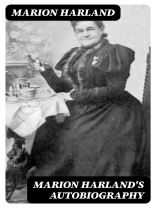In ‘Marion Harland’s Autobiography, ‘ the author offers a richly woven tapestry of her life, reflecting the intricate tapestry of 19th-century American society. Harland employs a candid and engaging style that captures her experiences with evocative detail, resonating with the reader through vivid imagery and heartfelt reflection. Rooted in the traditions of literary realism, this autobiographical narrative situates itself within a broader cultural context, showcasing the struggles and triumphs of a woman in a time when female voices were often marginalized in both literature and society. Marion Harland, born Mary Harriet Roberts, came of age amid the constraints placed on women during the Victorian era. Her life as a writer, homemaker, and mother, combined with her keen observations of societal norms, equipped her with a unique perspective that fuels her writings. Harland’s literary journey paved the way for her to explore themes of identity, gender roles, and social expectation, ultimately culminating in this poignant reflection of her own narrative. This autobiography is a must-read for those interested in American literature, women’s studies, or the historical evolution of personal narratives. Harland’s compelling voice invites readers to engage deeply with her life story, offering both inspiration and insight into the challenges faced by women of her time, making it a significant contribution to the literary canon.
Circa l’autore
Marion Harland is the pseudonym of Mary Virginia Terhune (1830–1922), a prolific American author known for her work as a novelist, domestic writer, and household advice columnist. Born in Amelia County, Virginia, she began her writing career early, with her first novel, ‘Alone’, published in 1854, which found remarkable success. Harland wrote numerous novels throughout her career, which were characterized by her engaging storytelling and often centered on domestic life and Victorian morality. Her literary style reflected the societal norms and challenges of her times, with a focus on the roles and perspectives of women, which was a groundbreaking approach in a period when female authors were not as commonly accepted. Harland’s works became a staple in American households, as she ventured into the realms of cooking, etiquette, and household management, with ‘Common Sense in the Household: A Manual of Practical Housewifery’ being one of her standout contributions in this genre. Her autobiography, ‘Marion Harland’s Autobiography: The Story of a Long Life’, provides personal insights into her experiences and the cultural context of her writings, proving an invaluable resource for understanding the evolution of American literature and society from a woman’s perspective during the nineteenth and early twentieth centuries. As a testament to her influence, Harland was honored with a residence in Staten Island, New York, named after her—the Marion Harland Cottage—thus cementing her legacy as a distinguished figure in American literature.












